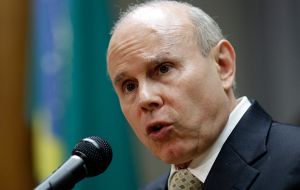MercoPress. South Atlantic News Agency
Brazil will continue to intervene in support of industry and depressing its currency
 Mantega argues that IMF Lagarde makes a mistake in recommending non intervention
Mantega argues that IMF Lagarde makes a mistake in recommending non intervention Brazilian Finance minister Guido Mantega said on Friday that IMF Managing Director Christine Lagarde makes a mistake in recommending emerging countries not to intervene in the money exchange markets to counter the strong devaluation of currencies from the rich countries.
Ms Lagarde is committing ‘a mistake’ and the government of President Dilma Rousseff has a very clear position on the matter and in “our case (intervening in the foreign exchange) is absolutely necessary and we shall continue to do so”, said Mantega in the framework of the IMF/World Bank spring meetings in Washington.
President Rousseff has campaigned openly in international forums arguing that the emerging economies are faced with a “monetary tsunami” because of the artificial “cheapening” of the US dollar and other (formerly) ‘strong currencies’.
However IMF managing director Lagarde has repeatedly considered inappropriate to adopt “interventionist policies”.
“Brazil is one of the countries which most suffers from the appreciation in value of the Real (local currency), our industry has lost competitiveness partly because of the weakening of value from the countries of other countries”, argued Mantega.
Furthermore “we are proving with facts that making precise spaced interventions in the foreign exchange market, a strategy used by other countries, we can reduce the disadvantages to our industries”, added Mantega.
As a result of this government intervention policy in the foreign exchange market this week the US dollar in Brazil climbed for five days running reaching 1.88 Real, a measure openly supported by the Sao Paulo Federation of Industries, FIESP.
However FIESP director Roberto Gianetti da Fonseca said that the increase was insufficient and advocated a US dollar in the range of 2.2 Real to really boost the competitiveness of Brazilian manufacturing and industries, according to Sao Paulo reports.
The US dollar in Brazil has dropped as low as 1.51 Real, but given the difficulties for the domestic industry and the flood of ‘cheap’ imports the government of President Rousseff has established a ‘non written’ floor of 1.80 Real to the greenback.




Top Comments
Disclaimer & comment rules-

-

-

Read all commentsThis tactic is known as 'The Race To The Bottom'. It is going to end in tears for Brasil who will end up with a reputation for destroying the monetary value of ivestors interests.
Apr 21st, 2012 - 12:03 pm 0If Brasil really wants to be 'in the big league' it need to carefully consider what the International Market thinks of it.
Brasil may well be at the crossroads of going forward (visits by the President to the USA, and everywhere else) or starting the long march back to where it was.
So far they have done very well in a bouyant market: now the real test of the President commences. And it has wrong footed itself with this protectionist measure.
Brazil's protectionist economy is probably the worlds only really successful protectionist model. It is the worlds 6th and soon will reach 5th. Asides from a very overvalued currency, it has very good long term prospects. Their agricultural sector is superb and their industrial sector doesn't really suffer from what usually affects protectionist models, such as inefficient industries and crappy products. Their current account and budgetary positions are good also. In fact I support the Brazilian central banks aggressive monetary policy and I hope they continue to buy dollars and lower their interest rates until the Real reaches a competitive value and growth returns to capacity.
Apr 22nd, 2012 - 07:12 am 0A huge contrast to the Argentine model of protectionism. I wish the Brazilians well.
@1
Apr 22nd, 2012 - 08:33 pm 0The race to the bottom is the capitalist way. Most efficiency at lowest cost. Now that Europe and the USA seem to have been dragged into it by the new global order of global capitalism, it seems you don't like the idea too much.
@2
Brazilian products are not that good. Their cars have a worse reputation than argie cars. They do have select industries that are excellent like petroleum, Embraer, and some others, but in general their products suffer from the same complacency of standards are other countries with closed industries.
Commenting for this story is now closed.
If you have a Facebook account, become a fan and comment on our Facebook Page!